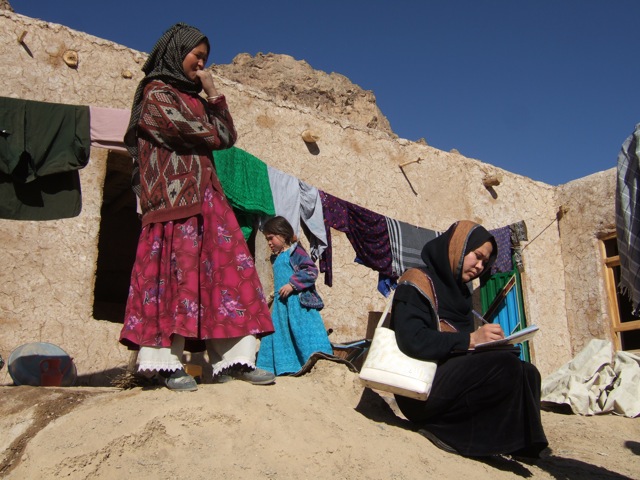
I slid down the rabbit hole into the fantasy world of international development in early 2003 when I landed in Kabul, Afghanistan. I unknowingly took my first step on a long journey to understand why solutions to extreme global poverty and its twin brother, war, remain so elusive. ARZU, which means "Hope" in Dari, is the social business enterprise I founded in 2004 to employ highly skilled, but destitute Afghan women. The point of ARZU is to employ as many women as possible, doing culturally acceptable work. We started with rug-weaving -- traditional work done in the home. But, we set a standard of fair wages and no child labor, in an industry that's not far behind global trafficking in its exploitation of women and children.
For almost a decade, I've been betting against the global trifecta of extreme poverty, illiteracy, and maternal death. During this time, ARZU has morphed into a learning laboratory to test innovation in grassroots models of economic development and the holistic delivery of critical services. Our instructors and our inspiration are the women themselves, struggling to survive under the harshest possible conditions at the bottom of the pyramid. I've learned that innovation and hope can thrive in the world's worst places.
From the outset, we faced an array of basic challenges. We had to figure out how to operate effectively in a gender-segregated, highly tribal, rural society with each village governed by its own complex mix of religious, legal, and local mores.
We had to work around the aftermath of war -- returning refugees, no infrastructure, disrupted supply chains, no commercial shipping, and in the early days, no banks, no internet and limited cell phone telephony. And then there was the security issue -- code for ongoing insurgency. To this set of constraints, we added the dimension of starting and managing a virtual company.
And, while this may not sound like a breakthrough idea, we staffed in Afghanistan only with Afghans, unlike big international development organizations that send in the expats for managerial posts. This one decision -- figuring out how to train and collaborate with a team a half a world away -- complicated and slowed down our early efforts. But like the tortoise and the hare, it has paid our biggest dividends. We now have a competent, trained Afghan management team that always get the "sniff test" right; we can fly below the radar screen as locals, which means we can move around and operate normally when expats gets locked down. And, we strive to be a low-cost operation. We don't use the standard-issue logo'd white Suburbans or guys with guns to go outside the Green Zone -- we're already outside.

A woman in ARZU's program signs The Social Contract. (Photo Credit: Thomas Lee)
Most importantly, as a tortoise, we've slowly built trusted relationships as far down as the household level. By consistently under-promising and over-delivering under the concept of our Social Contract with ARZU weavers and their families, we've earned the latitude to experiment.
This Social Contract is the basis on which we hire weavers. It's an the agreement, thumb-printed by the male head of household or by a widow herself, that sets out the rights and responsibilities of working for ARZU and, importantly, links compensation to both family engagement and product quality. In exchange for higher income, the family must agree to put all the children in school, girls and boys, and to release women for literacy classes and for pre and post-natal care.
Business is an applied and pragmatic field. Social business works the same way. You quickly learn in business that water runs downhill -- people are rational economic beings who will behave exactly as they are economically encouraged to do. Since ARZU weavers are typically the sole wage earners in large family groups, we've learned that we can respect cultural norms, while encouraging progressive behavior by adjusting the labor rate. We carefully follow the money. Its trail helps explain behavior and further inform our choices of what to do. So what's happened with our experiment? From a starting point of 30 weavers in 2004, ARZU has created about 700 private sector jobs in rural villages where little or no opportunity exists. Aside from the thousands of direct benefits -- the women and their families -- the ripple effect of our broader community-based programs touches the lives of tens of thousands of Afghans. The capacity for our impact is infinite. We're creating replicable models that we hope will be used and scaled by others, changing the system of international development, and, most importantly, improving lives across the globe.